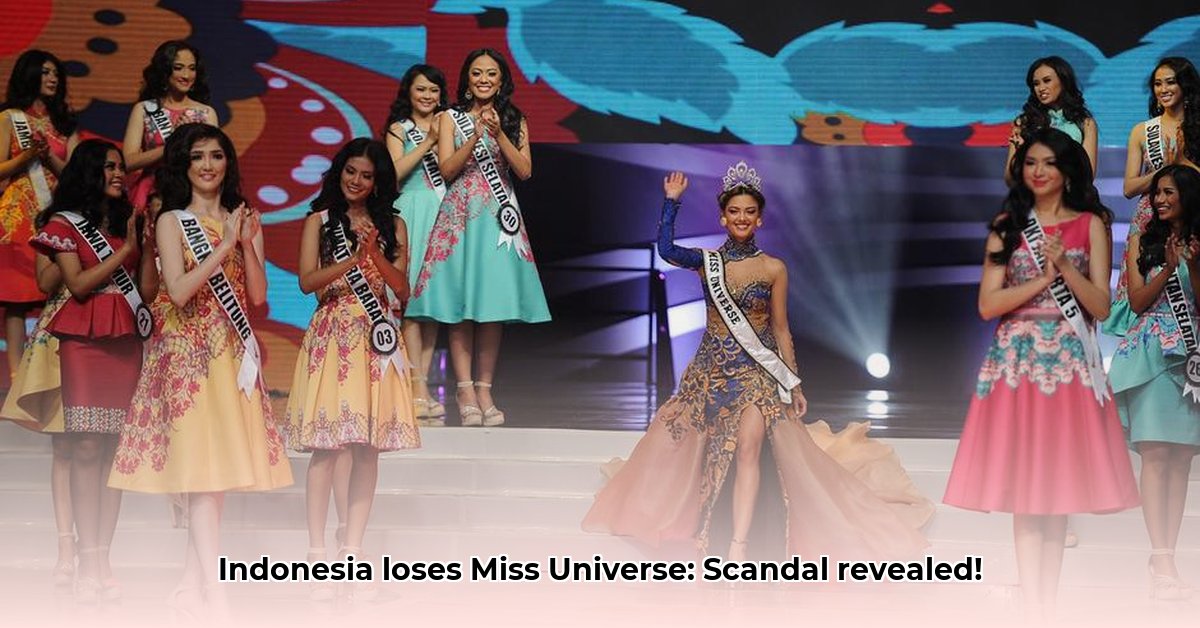The Miss Universe Organization (MUO) has revoked its Indonesian franchise following credible allegations of sexual harassment against pageant contestants. This decisive action underscores the critical need for robust safety measures, ethical conduct, and stringent accountability within the global pageant industry. For more details on the controversy, see this explanation.
The Fallout: Revocation of the Indonesian Franchise
The Miss Universe Organization’s decision to terminate PT Capella Swastika Karya’s Indonesian franchise marks a pivotal moment, sending a clear message regarding ethical boundaries and contestant safety. The allegations centered on “body checks” where six Miss Universe Indonesia contestants were allegedly subjected to inappropriate demands to undress. The gravity of these allegations triggered immediate concerns about power dynamics and ethical transgressions, resulting in the cancellation of the Miss Universe Malaysia pageant, which was also under the same license. Indonesian law enforcement has launched a formal investigation into the matter. This scandal reverberates throughout the industry, demanding a global conversation on safety practices and the urgent need for systemic reform within beauty pageants.
Here’s a detailed look at the stakeholders involved and the repercussions they face:
| Stakeholder | Immediate Impact | Long-Term Consequences |
|---|---|---|
| Miss Universe Organization | Reputational damage; loss of franchise; potential legal expenses. | Enhanced safety protocols; improved franchise vetting; public trust at stake. |
| PT Capella Swastika Karya | Legal action; reputational ruin; business collapse. | Potential closure; difficulty securing future contracts; legal repercussions. |
| Indonesian Authorities | Investigation; potential prosecutions; legal obligations. | Stricter pageant regulations; public safety mandate. |
| Miss Universe Indonesia Contestants | Emotional distress; legal involvement; potential long-term trauma. | Advocacy for change; increased safety awareness; empowerment of victims. |
This unfortunate incident emphasizes the paramount importance of unwavering ethical standards and transparent accountability mechanisms within beauty pageants. The future viability of the industry hinges on the Miss Universe Organization’s commitment to preventing similar incidents and fostering a safe, respectful environment for all participants.
Preventing Future Scandals: A Proactive Approach
The Miss Universe Organization’s decisive action sends a strong signal, but the underlying issues require systemic solutions. Allegations of sexual harassment, coupled with broader concerns about ethical conduct, highlight the urgent need for comprehensive reforms. How can future Miss Universe pageants proactively prevent similar scandals? Does financial instability within pageant organizations contribute to unethical behavior?
The Indonesian Case Study: Identifying Systemic Issues
The termination of the Indonesian franchise exposes profound systemic issues within the organization. The allegations of inappropriate conduct underscore the need for a robust ethical framework. This framework needs to include clear protocols for protecting contestants and effectively addressing ethical concerns. What specific actions can be implemented to ensure that such situations are not repeated?
Financial Stability and Ethical Conduct: A Crucial Link
The JKN Global Group, owner of the Miss Universe Organization, has faced financial challenges, including declining stock prices and bankruptcy filings. This financial instability raises concerns about potential compromises in ethical oversight. A critical question emerges: Is a stable financial foundation essential for upholding ethical standards within the Miss Universe Organization?
Strengthening Ethical Frameworks: Concrete Steps
To prevent future scandals, the Miss Universe Organization should implement the following measures:
- Establish Independent Oversight: Create a fully independent ethics committee with the authority to investigate complaints impartially. This committee must have the power to act swiftly and decisively in response to any future incidents.
- Mandatory Training and Education: Implement comprehensive, mandatory training programs on ethical conduct, sexual harassment awareness, and reporting procedures for all stakeholders, including contestants, organizers, staff, and judges.
- Ensure Transparency and Accountability: Implement transparent judging processes and establish clear, accessible channels for contestants to report concerns without fear of retribution or reprisal.
- Promote Financial Transparency: Regularly publish audited financial statements to enhance accountability and demonstrate the organization’s financial health and stability.
- Strengthen Franchise Agreements: Revise franchise agreements to include stricter ethical standards, clear accountability measures, and defined consequences for national organizers who violate these standards.
- Implement Robust Complaint Mechanisms: Establish confidential, easily accessible complaint mechanisms, ensuring thorough and impartial investigations of all reported incidents.
- Background Checks: Conduct thorough background checks on all individuals involved in the pageant organization, including organizers, staff, and judges, to identify and mitigate potential risks.
Rebuilding Trust: A Long-Term Commitment
Rebuilding trust requires sustained commitment, open communication, and concrete action. The Miss Universe Organization faces a significant challenge in regaining public confidence and demonstrating its commitment to ethical conduct and contestant safety.
Key Takeaways:
- The revocation of the Indonesian franchise underscores the urgent need for systemic change within the Miss Universe Organization, prioritizing the ethical safety and well-being of contestants.
- Financial instability can compromise ethical conduct, highlighting the importance of transparent financial practices and responsible financial management.
- Preventing future scandals requires independent oversight, enhanced training, transparent processes, and accessible complaint mechanisms.
- Transparency, accountability, and meaningful reform are essential for rebuilding trust and ensuring the long-term viability of the organization.
Comparative Analysis: Responses to Pageant Controversies Worldwide
The Miss Universe Organization’s response to the Indonesian situation highlights inconsistencies in how similar allegations have been handled globally. How have responses varied across different countries, and what lessons can be applied to ensure the safety and protection of future contestants?
Analyzing the Indonesian Case: A Swift Response
The Indonesian situation involved serious allegations of inappropriate conduct, prompting a swift and decisive response from the Miss Universe Organization. The franchise was terminated, in contrast to situations where similar allegations have resulted in protracted legal battles and less decisive action. What factors influenced the MUO’s decision to act so quickly, and what does it reveal about their evolving commitment to ethical standards?
A Global Perspective: Varied Responses to Similar Controversies
The varied governance structures of national pageants worldwide contribute to inconsistent responses to controversies. While the Indonesian situation led to swift action, other countries have often witnessed more muted reactions, delayed responses, or a lack of transparency. What accounts for these disparities?
Cultural contexts, legal frameworks, and the level of public scrutiny all play a significant role. In some nations, greater public pressure for accountability exists, while in others, cultural norms or legal limitations may hinder investigations or prosecutions. The involvement of media and women’s rights organizations also influences the outcomes. How does the level of scrutiny impact the way these controversies are addressed and resolved?
The Imperative of Consistency and Accountability
The Indonesian case underscores the need for standardized procedures within the Miss Universe Organization. A global code of conduct, applicable to all franchises, would ensure consistent responses to harassment allegations, along with swift, transparent investigations and appropriate disciplinary actions. What specific steps can be taken to ensure that contestants are protected and that offenders are held accountable, regardless of where the incident occurs?
Key Takeaways:
- The Indonesian franchise revocation highlights a global problem within the pageant industry, exposing vulnerabilities and demanding greater ethical oversight.
- Responses to similar controversies vary significantly across different countries, reflecting differences in cultural norms, legal frameworks, and the level of public scrutiny.
- The lack of transparency and accountability in some cases can undermine trust and perpetuate a culture of impunity.
- Adopting a standardized approach to handling harassment allegations is essential to protect contestants and promote a culture of safety.
- Improving accountability, transparency, and ethical awareness is vital for maintaining trust and ensuring the long-term sustainability of the Miss Universe Organization.
Future-Proofing International Pageant Organizations: Establishing Best Practices for Safety and Ethical Conduct
The Miss Universe Organization’s recent decision to revoke the Indonesian franchise serves as a stark reminder of the urgent need to prioritize contestant safety and ethical conduct. This situation demands immediate and comprehensive reform within international pageant organizations. How can the pageant industry effectively safeguard participants and prevent future abuses of power?
The Indonesian Case: A Catalyst for Change
The termination of the Indonesian franchise underscores the urgent need for systemic change, demanding a fundamental overhaul of policies and practices to protect contestants from harassment, exploitation, and unethical treatment. Can this incident serve as a catalyst for positive change, prompting a wider industry shift toward prioritizing the safety and well-being of participants?
Implementing Real Change: A Comprehensive Approach
Moving beyond superficial changes requires concrete steps toward genuine reform. This includes:
- Strengthening Accountability Mechanisms: Implement independent investigations into all allegations of misconduct. Establish confidential reporting mechanisms, independent of organizational leadership, to ensure safe avenues for contestants to report incidents without fear of retaliation.
- Overhauling Contestant Contracts: Review and revise contestant contracts to ensure fair compensation, reasonable working conditions, and clear protections against harassment, discrimination, and exploitation.
- Promoting a Culture of Safety: Foster a safe, respectful, and inclusive environment for all participants. Implement comprehensive training programs on ethical conduct, consent, bystander intervention, and reporting procedures.
- Elevating Transparency: Increase transparency by releasing financial records for public access, ensuring accountability and preventing potential conflicts of interest.
- Collaboration and Unified Standards: Encourage international organizations to collaborate in developing and enforcing unified ethical codes of conduct, creating consistent standards for all pageants.
The Path Forward: A Collaborative Industry Effort
The pageant industry must transition from a culture of tolerance for misconduct to one of zero tolerance. The Indonesian situation underscores the importance of addressing these issues proactively to ensure the survival and reputation of the industry. Can the pageant industry embrace ethical evolution and make contestant safety a top priority?
Key Takeaways:
- The Miss Universe Organization’s decision regarding the Indonesian franchise signifies a
- Unlocking Evie McGee’s Parents:A Deep Dive into Evelyn Colbert’s Success - July 25, 2025
- Discover Evie in Rosie’s Rules: A Complete Character Guide - July 25, 2025
- Evelyn McGee Colbert Family: 30 Years of Success and Love - July 25, 2025















